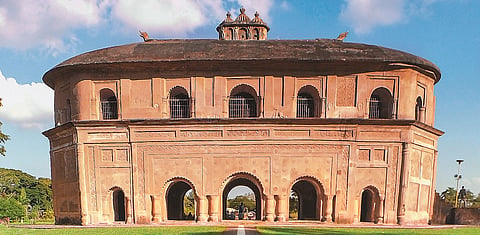
- Destinations
- Experiences
- Stay
- What's new
- Editor’s Picks
- Responsible Tourism
- CampaignsCampaigns
- Subscribe

I first heard of Dhudor Ali, the Lazy Man's Road, while living in Guwahati, and reading a history of Assam by Dr Swarna Lata Baruah. I read about the Ahom period, which began in 1228 when Sukapha, a chieftain from Mong Mao (somewhere around the present day boundaries of Assam, Myanmar, China's Yunnan region, and Arunachal Pradesh) crossed the Patkai mountains with several thousand soldiers and settled in upper Assam. He and his successors would rule Assam for six hundred years, influencing and being influenced by the tribes who already lived in the fertile Brahmaputra valley.
One of the later Ahom kings, Gadadhar Singha, decided to take a group of his subjects in hand -- these were the dhuds, or lazy men (they were probably also opium smokers). The king decided that the dhuds would build a road from Golaghat to Joypur in upper Assam. The road was built, but very slowly. I was writing, reading, and travelling while working on the novel that would turn into 'Keeping in Touch'. A road trip up Dhudor Ali seemed like a great idea.
My friend Veda came from Calcutta we hired a car, and set off one summer morning towards upper Assam. The journey towards Golaghat was largely uneventful. We stopped somewhere for pokori, and at one point I roused from a doze to realise Veda was so bored on the straight highway that she was playing chicken with oncoming lorries while overtaking other cars. After night fell, we passed the Numaligarh refinery, and went through a dense, forested area a tea estate. Our hotel in Golaghat was bright and cheerful and, unexpectedly, overlooked a new cricket stadium.
The next morning, we got onto Dhudor Ali, and headed for Sibsagar, the old capital of Assam. Driving on the old road was slow in a literal sense -- the surface was a series of potholes somehow strung together, but more than that, as Veda managed to keep the car struggling forward in first or second gear, there was a strange sense of being out of time, or in some special, slow, marginal period of time. Dhudor Ali saw only a little traffic -- a few cars, some cyclists, a few roadside stalls. We passed tea estates, and a forest reserve where two elephants, ridden by two small boys, emerged from the trees onto the road. The elephant, with a ponderous, well-practiced charm, lumbered to a halt on one side of the car. I offered up a banana, but the pachyderm could smell something more interesting Veda's bar of Cadbury's. The long, hairy trunk shot through the window, and, like the hose of a vacuum cleaner, frisked my person, while the boys nearly died laughing.
We carried on, and eventually, after what seemed like days or perhaps years, turned off Dhudor Ali to arrive at Sivasagar and the jewel-box-like, rosy stone buildings of the Rang Ghar and Karenghar. A year or more later, when I was in England writing about Dhudor Ali in 'Keeping in Touch', what remained most clearly from the whole experience was the very slowness of the road, the syrupy nature of time as the car slowly moved forward on the uneven surface, the inescapable sense of being contentedly at the margins of activity. These, the legacy of the trip, might also be the legacy of the Dhuds, at least in this writer's imagined encounter with their realm.
Anjali Joseph is an award-winning writer. Her novel 'Keeping in Touch' talks about the intricate and transformative dance in relationships, of characters navigating great changes in their lives, and of the place they find their way to -- Assam.
